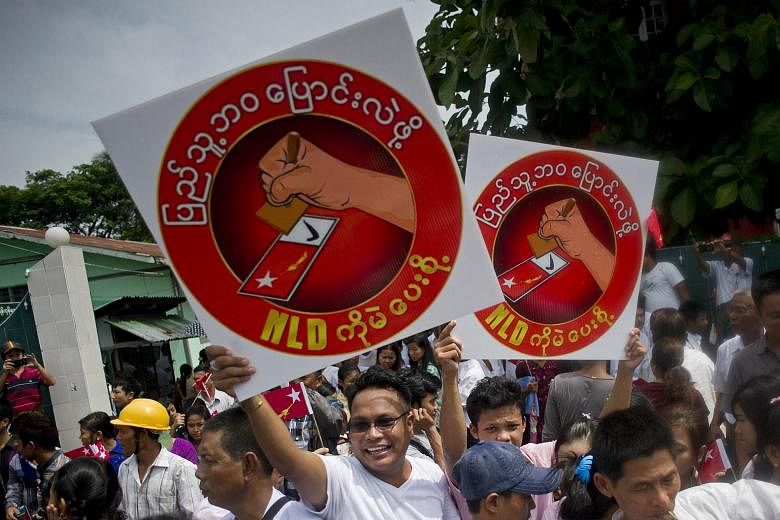Great expectations from Myanmar's first general election in decades on Nov 8 are unlikely to be met, analysts caution.
But despite much uncertainty over the shape of the country's future leadership, potential flashpoints in Rakhine and Shan states and a risk of renewed conflict if a ceasefire accord with armed groups is not reached, a U-turn on reforms is unlikely, said Dr Kyaw Yin Hlaing, adviser to the government on education and director of the Centre for Diversity and National Harmony in Yangon.
Dr Richard Horsey, a former top UN official in Myanmar and now an independent consultant based in Yangon, said: "In general, the broad arc of the transition will continue."
"There will continue to be international engagement and investment, and 7-8 per cent GDP growth for the foreseeable future is certainly possible," Dr Horsey told a forum yesterday at Chulalongkorn University's Institute of Strategic and International Studies.
The post-election scenario remains a huge uncertainty in a fragmented landscape in which as many as 89 political parties are contesting for positions in the 664-seat Parliament, 25 per cent of which are reserved for the military in what is in effect its insurance policy against abrupt change.
The elections "won't bring liberal democracy" but "Myanmar will muddle through", Dr Tin Maung Maung Than, senior research fellow at Singapore's Institute of Southeast Asian Studies, said at the same forum.
The three main power blocs - the ruling military-backed Union Solidarity and Development Party (USDP), the opposition National League for Democracy (NLD) and ethnic minority parties - all expect to do well at the polls.
The USDP is saying it will not be routed, and the NLD feels it could achieve the landslide it got in the aborted 1990 elections. Ethnic parties believe they can get 25 per cent of seats and be kingmakers.
"None of those expectations are likely to be met," Dr Horsey said. "The USDP will shrink in size from the 70 per cent of elected seats it currently controls. The NLD will become the largest single party but whether or not it will have an outright majority is an open question... Ethnic parties in the 1990 and 2010 elections achieved about 15 per cent of the seats, so they would have to double their electoral success."
As the Aug 14 registration deadline looms - pushed back from Aug 8 because some states are hit by devastating floods - the parties are scrambling to finalise their candidate lists.
Meanwhile, USDP, which sailed into power in 2010 in a flawed election boycotted by the NLD, is under strain. Its leader, Speaker of Parliament Thura Shwe Mann, 68, has incurred the displeasure of elements of the army for allowing a recent Parliament vote on rolling back the military's influence.
The attempt was defeated and the military remains entrenched, but Mr Shwe Mann has switched from the military-dominated capital Naypyitaw from where he won in 2010, to his home constituency in Phyu, near Yangon - seen by pundits as a safer bet for the former top general who says he wants to be president.
And incumbent President Thein Sein, 70, has said he is available to serve a second term if asked to.
A crucial part of the jigsaw is the peace negotiations with armed ethnic groups, which will resume today in what is in effect a last attempt to achieve an accord before the elections.
Leaders of various armed groups met President Thein Sein on Monday, and the army commander-in-chief yesterday. Peace process insiders are cautiously optimistic, but warn that the army's patience is running out and failure could lead to renewed conflict and some border areas ruled out of the polls.
Failure to reach an agreement this week could also plunge the peace process into a long hiatus, as the new government will officially take power only next March.
Still, Myanmar's transition should remain largely on track.
"They have buy-in from all of the political elites - the military, the Union Solidarity and Development Party, and the National League for Democracy," said Dr Horsey.
"The NLD seems to understand that to have a stable political transition, it must have a working relationship with the army," said
Dr Kyaw Yin Hlaing. "None of the stakeholders want things to go wrong, they want things to move forward."

